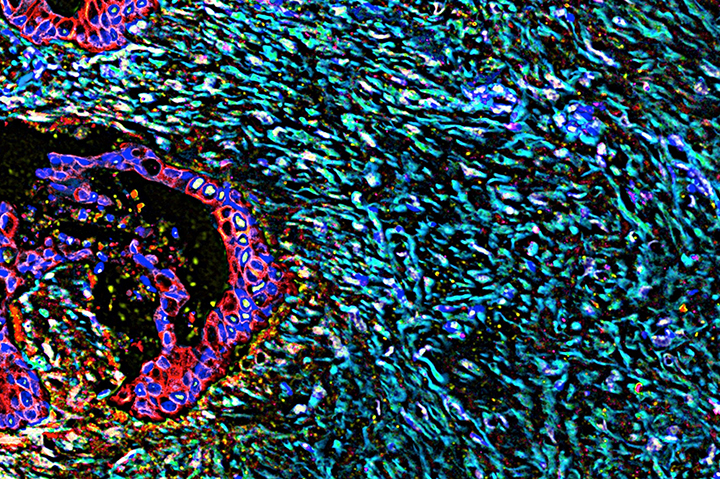More Effective Radiotherapy for Advanced Pancreatic Cancer Patients

Neelima Shah and Edna Cukierman; National Cancer Institute Visuals Online
Will adding a drug that blocks the growth of cancer make pancreatic cancer more sensitive to radiation treatment?
One of the characteristic features of pancreatic cancer is a dense, fibrotic framework around the tumor, called the stroma. The stroma plays a part in regulating disease progression, metastasis and response to treatment. Researchers are looking at ways to manipulate the stroma to make treatment more effective; this clinical trial tests a drug that can disrupt the chemical signals that encourage tumor growth.
What Is a Focal Adhesion Kinase Inhibitor?
Interactions between the tumor and stroma are controlled, in part, by a protein called focal adhesion kinase, or FAK. FAK is often hyperactivated and overexpressed in aggressive cancers, making the cancer more resistant to chemotherapy and able to grow faster. Pancreatic cancer researchers are testing whether inhibiting FAK can make the cancer cells more vulnerable to subsequent treatment, such as standard-of-care chemotherapy, radiotherapy or immunotherapy.
How the Trial Works
This phase II trial for patients with advanced pancreatic cancer will test if the FAK inhibitor defactinib can enhance the response to radiotherapy. All participants must have undergone prior standard chemotherapy. Researchers will track clinical outcomes such as progression-free survival (PFS), response rate, and toxicity.
Participants will be randomly divided into two groups. The experimental group will receive treatment with stereotactic body radiation therapy (SBRT) and 17 cycles of defactinib. If patients in this group qualify for surgical removal of their tumors, they will undergo SBRT before surgery and continue taking the defactinib after surgery. Participants who cannot have surgery will receive defactinib for 17 cycles. The small control group will receive only the SBRT treatment.
Disease progression will be monitored through blood work and biopsies.
We encourage you to consult your physicians for clinical trials that may be right for you. The website ClinicalTrials.gov provides more details about this trial as well as many others. Patients can sign up at the sponsor website. You can visit the Let’s Win Trial Finder for a list of all active pancreatic cancer clinical trials.





